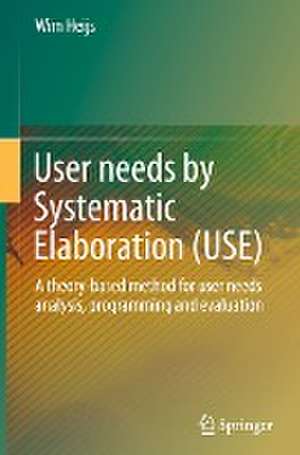User needs by Systematic Elaboration (USE): A theory-based method for user needs analysis, programming and evaluation
Autor Wim Heijsen Limba Engleză Hardback – iul 2022
| Toate formatele și edițiile | Preț | Express |
|---|---|---|
| Paperback (1) | 519.65 lei 6-8 săpt. | |
| Springer International Publishing – 2 iul 2023 | 519.65 lei 6-8 săpt. | |
| Hardback (1) | 636.80 lei 3-5 săpt. | |
| Springer International Publishing – iul 2022 | 636.80 lei 3-5 săpt. |
Preț: 636.80 lei
Preț vechi: 749.19 lei
-15% Nou
Puncte Express: 955
Preț estimativ în valută:
121.85€ • 127.56$ • 100.82£
121.85€ • 127.56$ • 100.82£
Carte disponibilă
Livrare economică 15-29 martie
Preluare comenzi: 021 569.72.76
Specificații
ISBN-13: 9783031020513
ISBN-10: 3031020510
Pagini: 128
Ilustrații: VI, 128 p. 27 illus., 10 illus. in color.
Dimensiuni: 155 x 235 mm
Greutate: 0.32 kg
Ediția:1st ed. 2022
Editura: Springer International Publishing
Colecția Springer
Locul publicării:Cham, Switzerland
ISBN-10: 3031020510
Pagini: 128
Ilustrații: VI, 128 p. 27 illus., 10 illus. in color.
Dimensiuni: 155 x 235 mm
Greutate: 0.32 kg
Ediția:1st ed. 2022
Editura: Springer International Publishing
Colecția Springer
Locul publicării:Cham, Switzerland
Cuprins
Chapter 1. Introduction.- Chapter 2. Disciplinary and methodological background.- Chapter 3. Perspective and conceptual framework.- Chapter 4. Method.- Chapter 5. Application.- Chapter 6. Review.- Appendix 1. Instruments.- Appendix 2. Questions and assignments.- Appendix 3. Application of USE in problem neighborhoods.- Index.
Textul de pe ultima copertă
The design of a building can facilitate the process of use and promote the well-being of users if it meets their needs. Knowledge of user needs and processes of use is important for a good design. However, it is not self-evident what user needs really are, how user needs and processes of use can be researched, and how that knowledge can be used in a design. This book introduces an integrated methodology for the analysis of user needs, programming and evaluation that answers these questions. The purpose is to improve the interaction between the users and their environment and to avoid failure costs by facilitating proper design decisions. The theoretical perspective and the conceptual framework originate from environmental psychology, more specifically P-E fit theory. The target group consists of those who are interested in creating environments for people (designers, users, real estate managers; students and scientific staff). Designers are a special audience for whom the book can be a guide to working for and with users. The theoretical perspective and the conceptual framework can also be relevant for scientific research into the interaction between users and buildings.
Caracteristici
An integrated methodology covering user needs analysis, programming, and evaluation A structured protocol for identifying user needs as personal states and activities in the process of use The translation of a process of use (interaction users - building) into a program of demands
